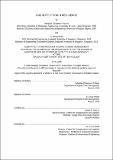| dc.description.abstract | The demand for Liquefied Natural Gas (LNG) has continued to grow globally over the past decade with increasing numbers of disruptions and plant outages. Considering these dynamics, oil and gas companies will have to prepare their operations to meet increasing demand with agile response to disruptions. This is particularly true with the case study company for this capstone, a company that manages the upstream oil and gas pipeline infrastructure in Nigeria. This capstone project used historical supply chain disruption data of the case study company to develop a model for prioritizing response to multiple pipeline disruptions. Our case study company has operations in two hubs where response to pipeline disruptions are traditionally treated at individual hub level. Our study shows that a holistic treatment of the entire network rather than in hubs could potentially improve supply chain resilience. Firstly, an existing resilience framework, the Balanced Scorecard of Resilience (BSR) model, was adapted to the unique characteristics of the gas pipeline network to determine the expected business impacts of each node. Secondly, the expected business impacts and cost of restoring disruption was used in ranking response and repair. It was shown that the BSR framework could be adopted to gas pipeline network, this adoption could enable practitioners and managers to make informed risk-based business decisions in enhancing overall LNG supply chain resilience. | en_US |
